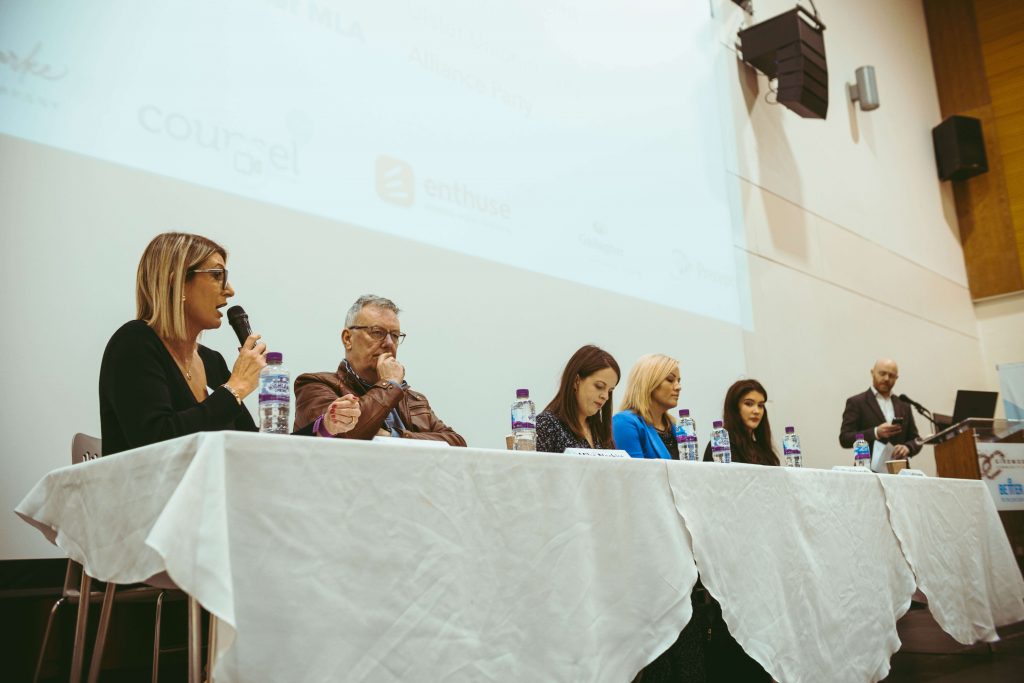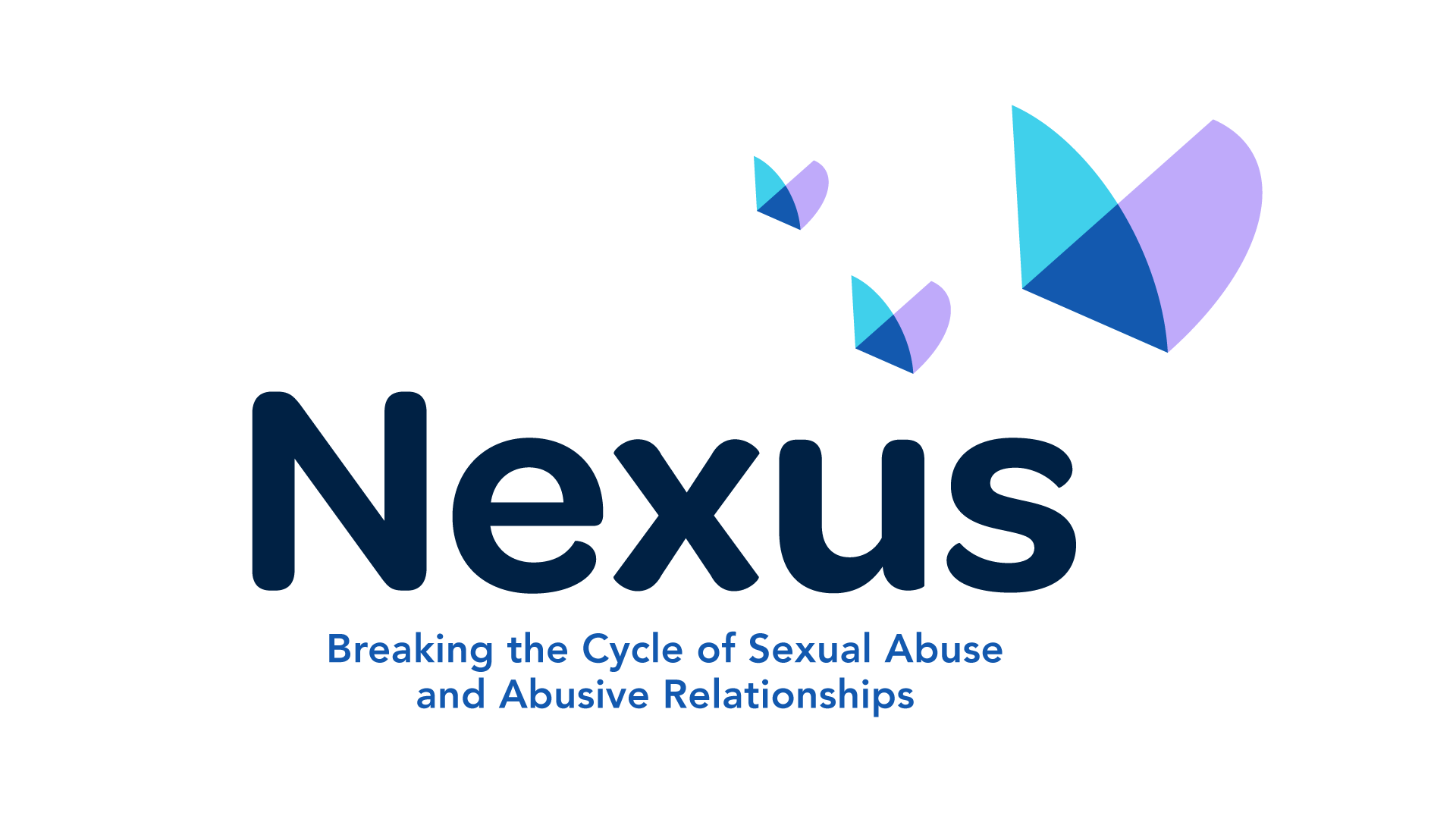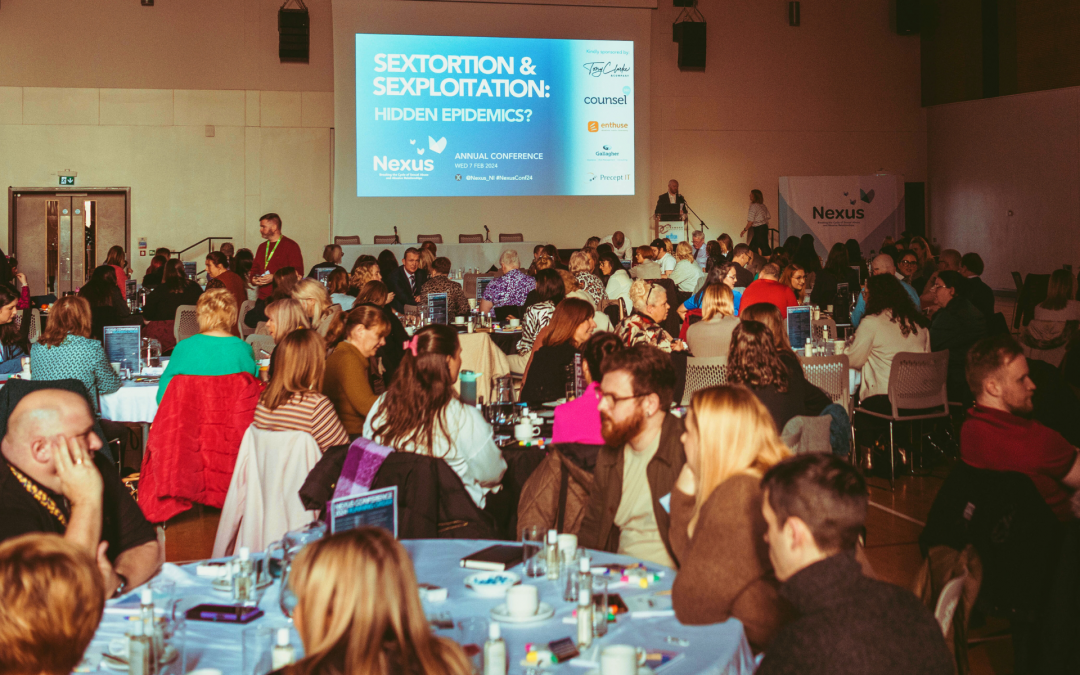Review: 2024 Conference ‘Sextortion & Sexploitation: Hidden Epidemics’
At Nexus, one of the ways we mark Sexual Abuse and Sexual Violence Awareness Week each year is by holding our annual conference. This year it took place on Wednesday 7th February in Belfast and explored the themes of sextortion and sexploitation, questioning whether these are “hidden epidemics” in our society.
Following a warm welcome from our compere Barra Best, the day kicked off with an opening address by our CEO, Joanne Barnes, who noted that in Nexus’ 40 years of existence, so much yet so little has changed in terms of how we as a society view sexual abuse. Joanne noted the challenges the digital world continues to present for services and service users, particularly for younger people who have grown up online, and especially relating to the key themes of the conference. Joanne commented on the continued growth in demand for support services, noting that the needs of many people that we support have become greater and more complex.
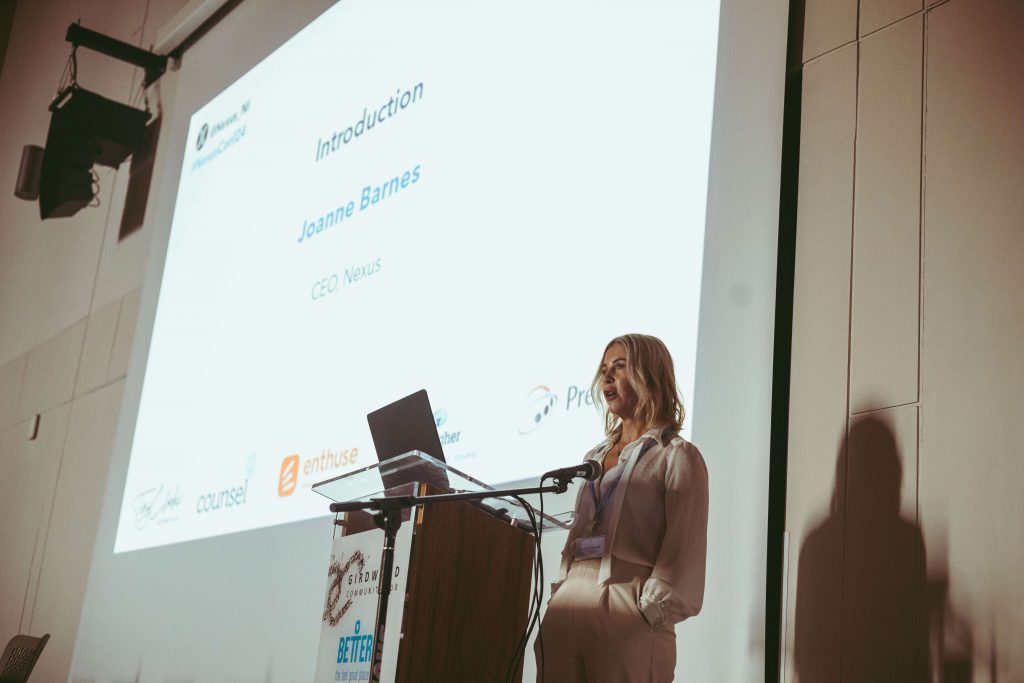
Police Service of Northern Ireland – Sextortion
Following Joanne’s address, Oonagh Ryan from the Police Service of Northern Ireland was welcomed to the stage slightly earlier than planned due to technical issues which, spoiler alert, continued to pepper the day! (Side note: we’d like to thank our contributors and delegates for being so patient and understanding whilst our team wrestled with technology that had been tested the day before and morning of – we were assured by Bill Woodside that if it can happen to Bill Gates it can happen to anyone, regardless we were as disappointed as most). Oonagh spoke to the work the PSNI have been undertaking since 2015 to tackle the issue of sextortion, noting that since then, there’s been a year-on-year rise in reports of the crime to police. Some key points learned from Oonagh were that:
- 27% of sextortion victims are under the age of 18
- The police received up to 80 reports of sextortion every month in 2022/23
- Over 60% of victims of sextortion the PSNI know of are between the ages of 12 and 23
Additionally, Oonagh advised that education and awareness raising is key to tackling and preventing the issue of sextortion, emphasising that “we’re not going to police our way out of this, it’s about educating our children”. To date, the PSNI have reached over a quarter of a million young people via social media adverts, informing them of what to watch out for when using social media and gaming platforms, where criminals lurk to prey on victims. It was encouraging to hear from Oonagh that the PSNI are ahead of the curve with this issue, exemplified by the fact that reporting levels in Northern Ireland are as high as they are to Police Scotland, despite Scotland’s population being 2.5 times that of NI.
Following Oonagh’s address we watched a pre-recorded interview (once the sound was working!) between Barra Best and Nathan McErlean, a 26-year-old male with lived experience of sextortion. Nathan exhibited strength and bravery in his mindset, acknowledging the devastating impact that being impacted by sextortion can have, though affirming a message of hope to others that “it’s not the end of the world”.
Chris Quinn: NI Children’s Commissioner – Child Sexual Exploitation
Next up Chris Quinn, Northern Ireland Commissioner for Children and Young People, took to the stage. Chris opened by stating that Child Sexual Exploitation (CSE) doesn’t get the exposure it needs or deserves here in Northern Ireland and that he and his team at NICCY are committed to working with the newly formed Executive to put children front and centre. Chris advised that to properly tackle CSE, a number of key issues should be tackled, including:
- Poverty: there needs to be an anti-poverty strategy in NI, and in particular tackling child poverty should be a priority issue.
- Age of criminal responsibility: the age of criminal responsibility should be raised to 16 from 10.
- Homelessness: a strategy to protect homeless people from harm is needed.
- Family support: overall support available for families and communities in NI should be increased.
- Education: children’s rights to Relationship and Sexuality Education and information must be adhered to and we must listen to children about their needs.
Summing up, Chris emphasised that the Barnahus Model of child-friendly multidisciplinary and interagency interventions for children impacted by sexual abuse needs to be strived for in Northern Ireland, and that it cannot be “Barnahus-lite”. Chris left our delegates with a simple yet poignant point about CSE – behind every report, there are many more that we don’t hear about.
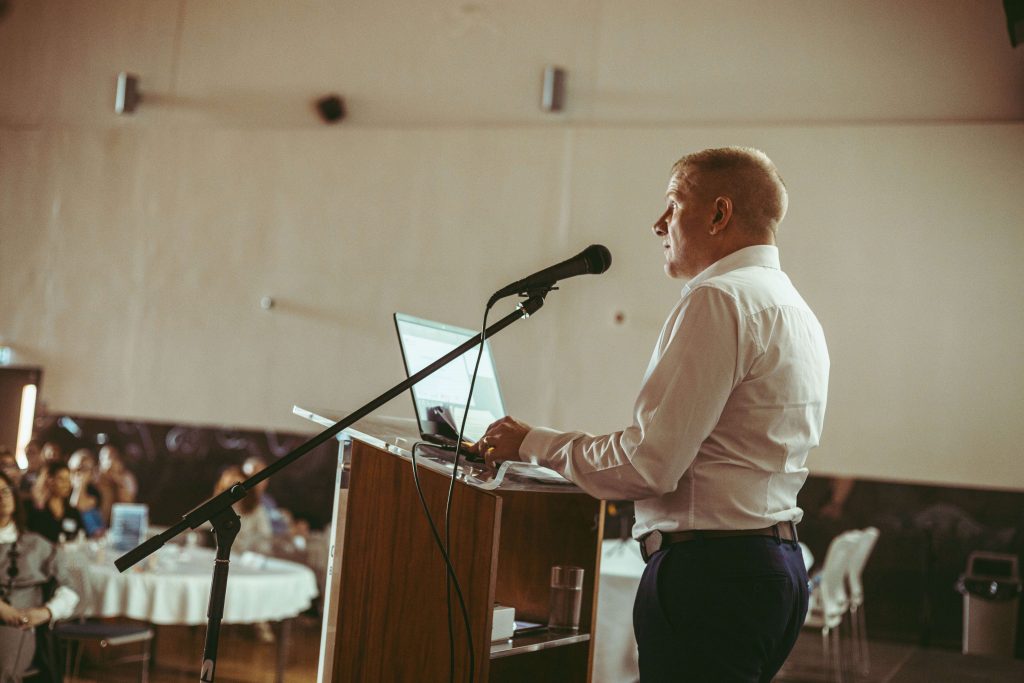
Include Youth’s ‘Agent Kathleen’ animation should have preceded Chris Quinn’s address. You can watch the video below.
Stephen Hughes: St Peter’s Immaculata – Child Criminal Sexual Exploitation
Following Chris Quinn, we heard from Stephen Hughes, a Senior Youth Worker at St Peter’s Immaculata Youth Centre in West Belfast. Stephen passionately spoke about a case of CSE that he and his colleagues had uncovered. He shared that seven young women and one young man were being exploited by criminal gangs, who he believes are “impinging on children and young people under our noses”. Stephen emphasised that CSE and Child Criminal Exploitation (CCE) are intertwined and that there is so much more that needs to be done to tackle both.
Stephen advised that he and his team had experienced challenges with the National Referral Mechanism (NRM) and called for this to be fully rolled out in Northern Ireland to tackle both CSE and CCE. He also called for partnership and interagency work to be improved, and that as professionals we need to be more person rather than process-driven.
To finish, Stephen emphatically expressed that “there are lots of excuses, but what we need are resolutions”.
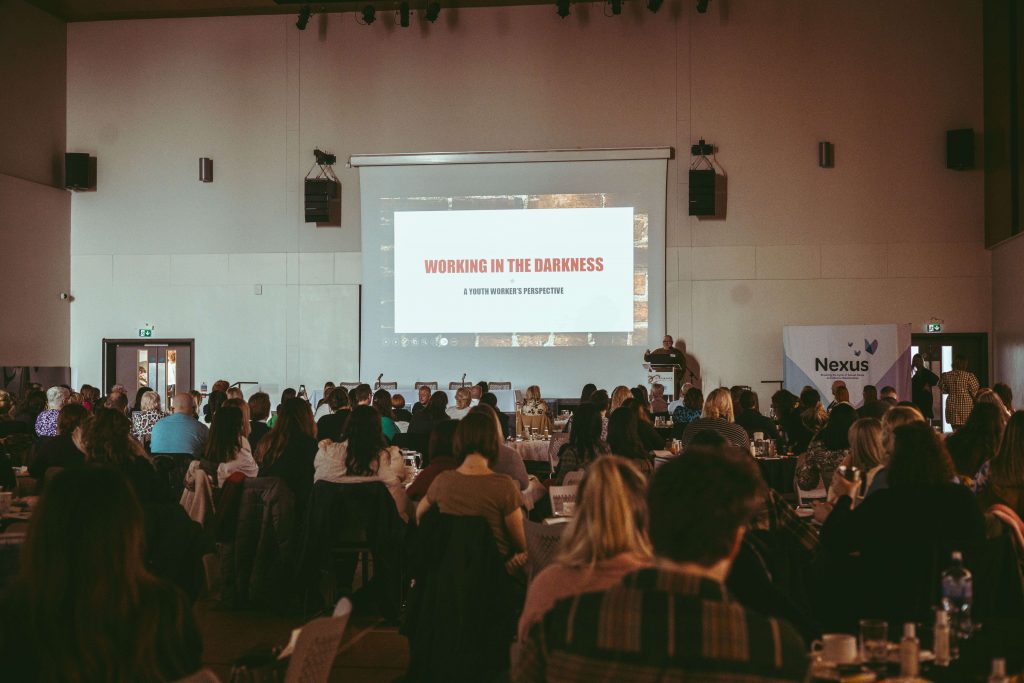
Bill Woodside: Ineqe Safeguarding Group
Next up was Bill Woodside, Chief Operating Officer of Ineqe Safeguarding Group, who began his address by noting that “exploitation begins with vulnerability” and online harms have offline roots, so the context of a child’s life is important when considering risk of online sexual exploitation. Bill candidly noted that due to generational differences in digital technology use, many parents do not understand what or who their children are associating with online. Furthermore, the age at which children have access to devices becomes younger and younger each year, which increases vulnerability.
Bill talked to us about the number of people listed as posing various forms of sexual threat to children in the UK, which, as of 2023, was up to a staggering 830,000 according to the National Crime Agency. He also noted the complexities of online child exploitation, including children encouraging other children to partake in sending explicit content, and the threat of new technologies such as artificial intelligence (AI). Summing up, Bill noted there are improvements to be made across sectors, organisations, and communities to keep children safer online, including: better record keeping, stronger partnership working, more resource allocation, and increased communication to make decisions. He finished with a simple yet clear message: “If you want to keep children safe online, make them less vulnerable and less accessible”.
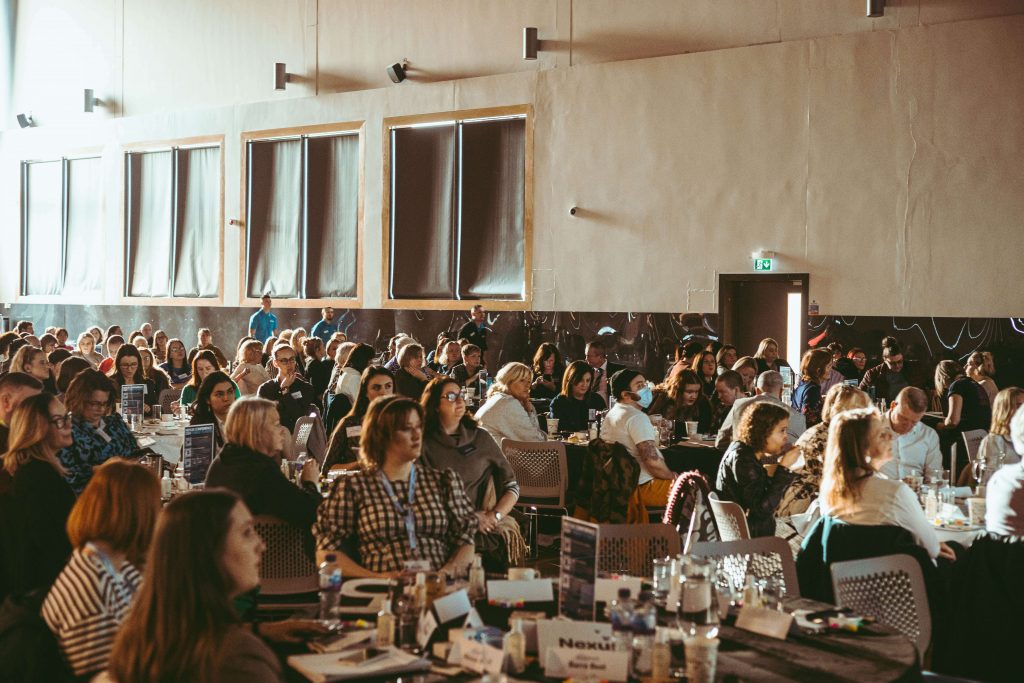
Bill included the video below in his presentation which warns adults about protecting children’s virtual privacy. Warning – contains strong language and content some may find disturbing.
Expert Panel: Child Sexual Exploitation
Before lunch we welcomed a panel of experts, including:
- Bimpe Archer – Regulatory Affairs Manager, Ofcom
- Chris Quinn – NI Children’s Commissioner
- Jacqui Durkin – Chief Inspector of Criminal Justice in Northern Ireland
- Sheina Rigg – Professional Officer (Committees), Safeguarding Board for Northern Ireland
- Paul McConville – Professional Social Work Adviser/Social Services Officer, Department of Health
The panel discussed a range of issues relating to CSE. These issues included: the need for focus on perpetrator intervention programmes to tackle re-offending and the root causes of offending, budget cuts and chronic underfunding having the most impact on the most vulnerable in our society, the importance of educating our children with appropriate and scientific RSE to protect them from harm, and the need for a victim-centred approach across all areas relating to CSE and any form of exploitation.
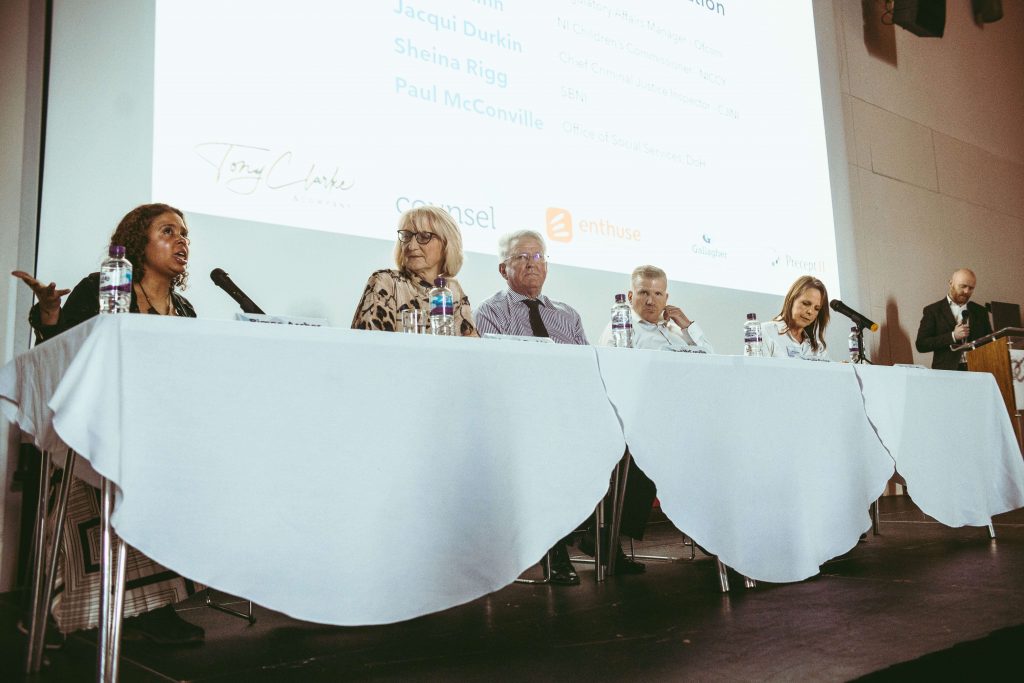
Ilja Abbattista – Survivor of Modern Slavery and Human Trafficking
Following a delicious lunch provided by Dante catering, we heard from Ilja Abbattista, a woman with lived experience of exploitation in the form of modern slavery and human trafficking. Ilja highlighted that her story was not only about her personal experiences, but also about how her family dealt with those experiences, conveying the wider impact exploitation can have on families and communities.
Ilja told us that during the period she was exploited, it was “a constant fight” to protect herself. She also heartbreakingly told of how she began to feel like nobody was going to help or save her, yet when she was helped and escaped, it was incredibly hard to try to return to normal life due to the abuse she had faced.
Ilja spoke of her mother’s own trauma and how this was passed down to her, compounding, until Ilja herself made the decision to break the cycle with her own children. Finishing off, Ilja read us a powerful and emotive poem she wrote when she was a young woman, echoing the sentiment of earlier speakers that we must protect our young people and continue this protection into adulthood too.
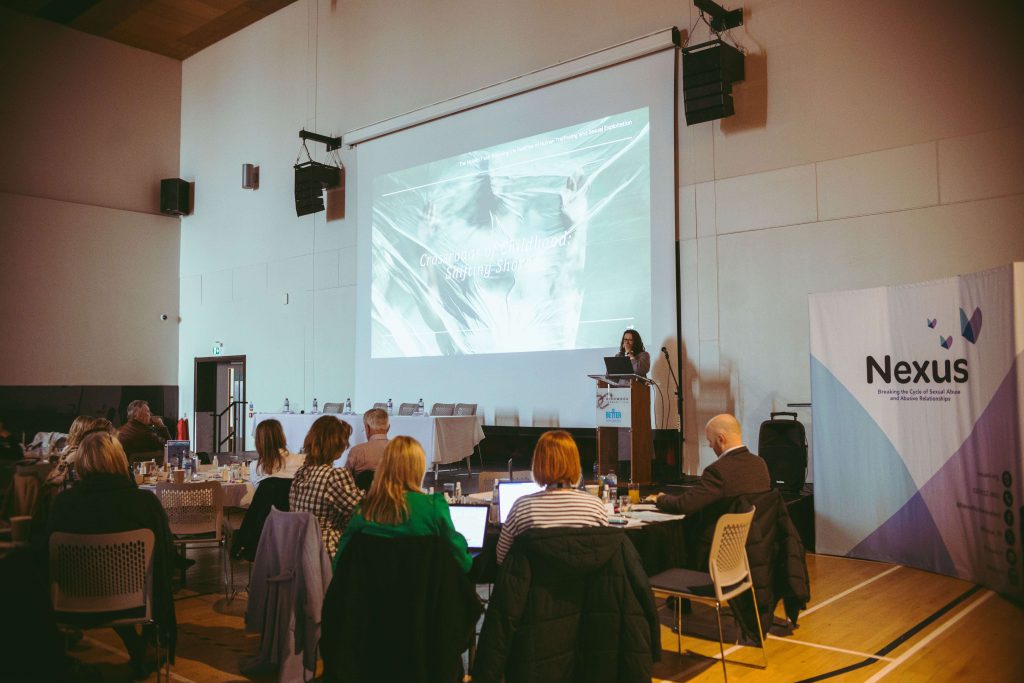
Gillian Glass: Belfast and Lisburn Women’s Aid
We then heard from Gillian Glass, a Trafficking Support Worker at Belfast and Lisburn Women’s Aid, which holds a contract with the Department of Justice to provide support to women who have been trafficked to or within Northern Ireland. Gillian began by advising that figures and statistics are just the tip of the iceberg and that modern slavery cuts across all areas of society.
Gillian shared stories of the women she has supported over the years, highlighting one woman in particular who had had a flair for drawing since she was a child; when this woman arrived in Northern Ireland, she would only draw in black and white, but over time she began to introduce colour into her pictures, which was perhaps a metaphor for the rebuilding of her life after abuse.
Throughout her address, Gillian reiterated a common theme of the day – that we must commit to educating and raising awareness of exploitation, including human trafficking, at all levels of society.
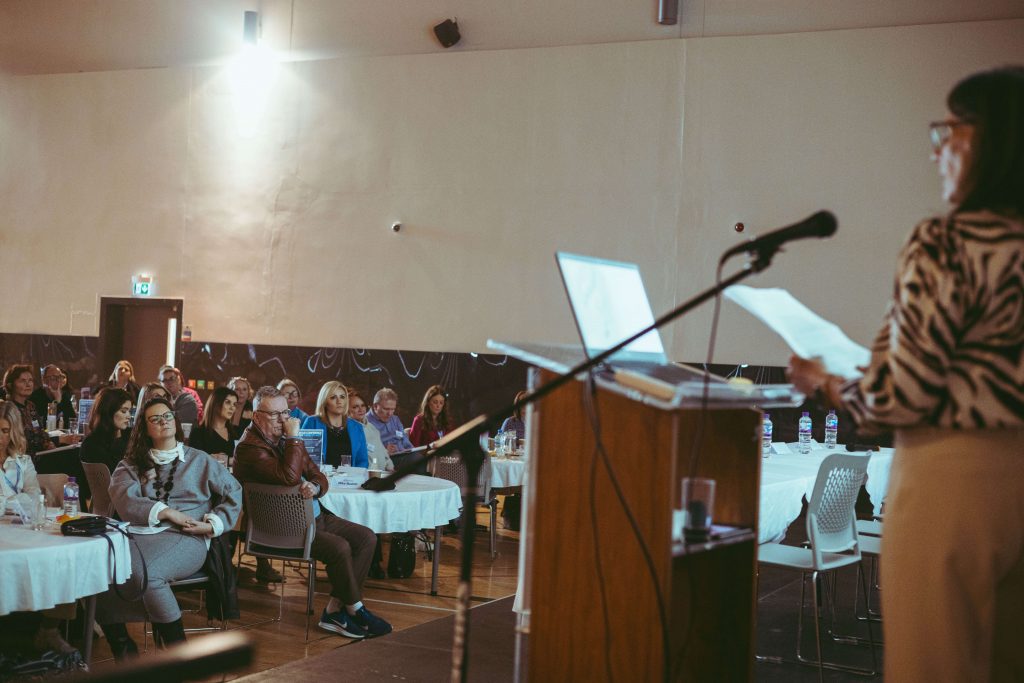
Workshops:
After Gillian’s address, our delegates attended their designated workshop. We’ve summed up the key learnings from each workshop below:
Child Sexual Exploitation: SEEN 'Sexual Exploitation Ends Now' Project: Who We Are, What We Do and How We Do It! - Barnardo's NI
Takeaway 1: The online world is a minefield. We need to create an environment to be online with children and make it normal so that they can feel comfortable to share if anything was to crop up. There is no offline vs online world for children now – they are one and the same.
Takeaway 2: Be mindful of language. Don’t say to children ‘you are putting yourself at risk’ – it’s other people putting them at risk. It’s important that we are empowering children rather than making them think they are the problem and have caused the exploitation.
Takeaway 3: When working with children we must always ask questions if something doesn’t seem right, and as parents or carers we must create very clear boundaries about usage… ‘the normal use of technology in this home.’
Educating Young People on Human Trafficking and Keeping them Safe: Human Trafficking & Sexual Exploitation (The Junior Education Programme) - Invisible Traffick
Takeaway 1: The National Referral Mechanism (NRM) is the process by which the UK identifies and supports potential victims of modern slavery by connecting them with appropriate support, which may be delivered through the specialist Modern Slavery Victim Care Contract, local authorities and asylum services.
Takeaway 2: Human trafficking is a 245 billion US Dollar industry (excluding forced marriage). $169.9billion of this is from sexual exploitation.
Takeaway 3:There has never been a UK born male child from Northern Ireland referred to the National Referral Mechanism, even though we know there are victims that are boys, however there is so much red tape around referring them.
Life After Rescue - Flourish NI
Takeaway 1: Support is offered by Flourish NI to anybody over 16 and their families. Signs of human trafficking are extremely vast.
Takeaway 2: The type of support required to rebuild lives after trafficking is extensive and covers all areas of a person’s life.
Takeaway 3: Effects of sexual exploitation can continue throughout a person’s lifetime – most of the effects are carried with them every day.
Online Child Sexual Exploitation - Nexus
Takeaway 1: Grooming is the starting point of abuse and it’s intentional and targeted by perpetrators. It establishes compliance – not same as consent. Young people may believe they are consenting, but grooming removes ability to consent.
Takeaway 2: CSE is a child protection issue. CSE is about the concept of exchange, where the young person receives something in return for sexual activity. Can be tangible like food, alcohol/drugs, somewhere to live to non-tangible like affection, protection/safety or to prevent something negative happening. CSE is also about an imbalance of power – power lies with the perpetrator, can be age, status, dependency.
Takeaway 3: The internet has made it easier for offenders to access victims, increases likelihood of offending at a lower risk and offers a variety of ways for both contact & non-contact abuse to take place. Unique impact of online abuse is the revictimisation each time the episodes of abuse are viewed by others. Online abuse also has no geographical limitations, is easy to conceal, and enables immediate contact 24/7. It’s also easy to be anonymous online. AI is a new threat – particularly the ability to create child sexual abuse images.
Understanding the Hidden Reality of LGBTQIA+ Sexual Exploitation: A Guide for Allies - The Rainbow Project
Takeaway 2: There is a hidden reality of the queer experience where people are exploited by people who control every aspect of their lives, particularly the hidden parts. This can include threats of ‘outing’ them to their social circle.
Takeaway 3: Without proper education, particularly RSE, we’re putting our young people in danger.
Sextortion - Police Service of Northern Ireland
Takeaway 1: There are different types of sextortion and reasons why sextortion is perpetrated e.g. money, more images. There are also different offender profiles that te PSNI must tackle differently.
Takeaway 2: The Safeguarding Board NI & Ineqe are contracted to develop sextortion info hub.
Takeaway 3: There are challenges regarding criminal justice systems in other countries that make it difficult to prosecute offenders.
Cross-Party Political Panel: The Way Forward
Following the workshops, our delegates rejoined us in the main conference hall for our final segment of the day – a cross-party political panel featuring (left to right):
- Linda Dillon, Sinn Féin
- Mike Nesbitt, UUP
- Nuala McAllister, Alliance
- Diane Forsythe, DUP
- Cara Hunter, SDLP
